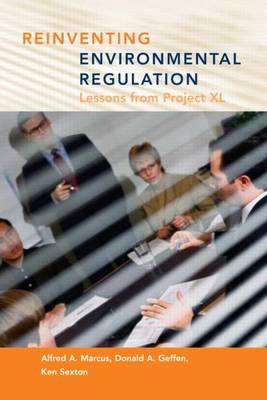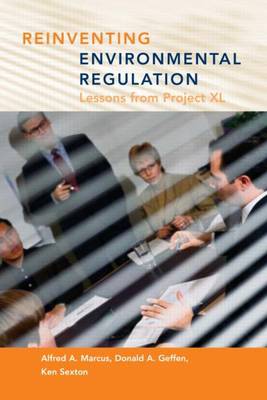
- Afhalen na 1 uur in een winkel met voorraad
- Gratis thuislevering in België vanaf € 30
- Ruim aanbod met 7 miljoen producten
- Afhalen na 1 uur in een winkel met voorraad
- Gratis thuislevering in België vanaf € 30
- Ruim aanbod met 7 miljoen producten
Zoeken
Reinventing Environmental Regulation
Lessons from Project XL
Alfred A Marcus, Donald A Geffen, Ken Sexton
Paperback | Engels
€ 72,45
+ 144 punten
Uitvoering
Omschrijving
Project XL (eXcellence and Leadership) was the flagship effort by the Clinton administration for 'cleaner, cheaper, and smarter' regulation. Under Project XL, business promised better performance in exchange for a regulatory approach focused more on results than means, with the Environmental Protection Agency (EPA) measuring pollution reduction across rather than at individual sources within a facility. Reinventing Environmental Regulation is a compelling account of the breakdown in negotiations to implement Project XL at a tape manufacturing plant of 3M, a company widely recognized as environmentally progressive. Marcus, Geffen, and Sexton discuss the conflicting goals of participants, the influences of personality and organizational culture, and complications caused by changes in 3M's external business environment. They compare the 3M case with EPA negotiations involving Intel, Merck, and Weyerhaeuser, finding similarly contentious, though less fatal disagreements about the meaning of 'superior environmental performance.' In common with other recent proposals, Project XL emphasized cooperative, flexible regulatory approaches. Reinventing Environmental Regulation demonstrates the difficulty of putting these appealing ideas into practice, while offering encouragement for continued innovations.
Specificaties
Betrokkenen
- Auteur(s):
- Uitgeverij:
Inhoud
- Aantal bladzijden:
- 256
- Taal:
- Engels
Eigenschappen
- Productcode (EAN):
- 9781891853098
- Verschijningsdatum:
- 4/09/2002
- Uitvoering:
- Paperback
- Formaat:
- Trade paperback (VS)
- Afmetingen:
- 151 mm x 232 mm
- Gewicht:
- 412 g

Alleen bij Standaard Boekhandel
+ 144 punten op je klantenkaart van Standaard Boekhandel
Beoordelingen
We publiceren alleen reviews die voldoen aan de voorwaarden voor reviews. Bekijk onze voorwaarden voor reviews.











